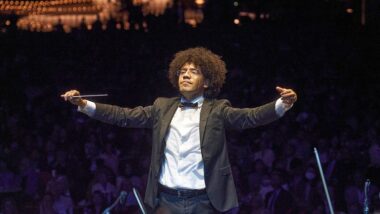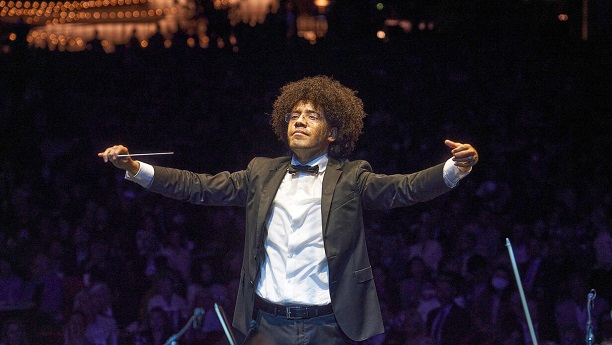 United Kingdom Gubaidulina, Shostakovich, Stravinsky: Vilde Frang (violin), London Symphony Orchestra / Rafael Payare (conductor). Barbican Hall, 23.2.2023. (CC)
United Kingdom Gubaidulina, Shostakovich, Stravinsky: Vilde Frang (violin), London Symphony Orchestra / Rafael Payare (conductor). Barbican Hall, 23.2.2023. (CC)

Gubaidulina – Fairytale Poem (1971)
Shostakovich – Violin Concerto No.1 in A minor, Op.99 (1948, rev.1955)
Stravinsky – The Firebird (complete, 1910)
We met conductor Rafael Payare in August last year in Montréal, Canada (click here); I should also mention a significant Shostakovich Symphony No.11 with his previous orchestra in San Diego that rightly received critical praise. Payare made his London Symphony Orchestra debut in 2014 and is clearly building up quite a rapport with the orchestra.
Sofia Gubaidulina’s Fairytale Poem of 1971 offers rarefied, post-Webernian beauty, the two flutes and ascending strings leading to high clarinets garlanded by the strings, who then take over this remarkable soundworld. Gubaidulina offers a tapestry of sound, immediately appealing and yet carefully, cogently constructed. The piece was written for a children’s radio show, in a dramatisation of the fairy story Křida (Chalk) by the Czech author Miloš Macourek. A piece of chalk fantasises about all the things it could draw though it is actually used for equations and words instead, diminishing in size until it is useless. Almost at its end, it is found by a child who uses what is left to ‘paint’ and draw, and at the close, the chalk disappears into the images it had once dreamt of. The idea of artistic endeavour surviving despite harrowing circumstances might indeed be a metaphor; but Gubaidulina preserves the sense of enchantment brilliantly.
The piece is utterly remarkable, from that fantastical opening to the staccatissimo repeated piano cluster chord that punctuates fluttering strings, flute, and percussion like a hammer. Payare’s clear and expressive beat brought out the very best in the LSO, who are clearly responsive to him at all times. The sheer level of concentration (from the orchestra, at least) was remarkable. Gubaidulina’s timbral transformations were beautifully realised, with some positively luminous chords towards the close.
Shostakovich’s First Violin Concerto is an astonishingly powerful piece. It was written in 1948 but not premiered until seven-and-a-half years later, in October 1955, and performed four months later in Moscow. The piece is dedicated to David Oistrakh. There have been a couple of significant performances of this piece over the last few years: Simone Lamsma with the Strasbourg Philharmonic under Aziz Shokhakimov in May last year, and Patricia Kopatchinskaja (who was the originally advertised soloist in Strasbourg) with the Aurora Orchestra and Nicholas Collon at last year’s BBC Proms. This time it was Dutch violinist Vilde Frang in the spotlight.
I reviewed Frang’s performance of Bartök’s First Violin Concerto in Berlin Philharmonie with the Berlin Radio Symphony Orchestra under Vladimir Jurowski in September last year, saying it was ‘a terrific performance of huge virtuosity and élan, entirely convincing at every turn,’ and the same could easily apply to her performance of the Shostakovich First with Payare. The long lines of the expansive opening Nocturne (marked ‘Moderato’) carried huge weight, while the orchestra offered a chthonic underpinning thanks to the eight double basses. Frang’s sound was positively smoky at the opening; her core sound was slightly wiry (but not for one second thin), which suited the melodies perfectly, while her lower register was positively throaty. Most important of all was the way Frang understood Shostakovich’s lines; Payare, meanwhile, proved himself the perfect partner with her throughout. There was a timelessness about this performance that was absolutely transfixing, while Frang’s playing was notable for the sheer purity of her intervals within the line (the sustained high note at the movement’s end was also the finest I have heard live).
The fierce Scherzo was a riot of energy. Virtuoso, certainly, but utterly relentless – and how Payare assured definition in the lower strings at speed. How different the Passacaglia, with its softening. Daniel Jemison’s bassoon solos were particularly noteworthy, as was the combined insight of Frang and Payare in seeing the piece as one great cumulative, carefully calibrated uncurling (Frang’s stopping, too, was so perfectly in tune). The rapport of soloist and conductor extended into the Burlesque finale – Shostakovich’s writing here is merciless, his demands for co-ordination between violin and orchestra almost insuperable – and it was just this element that spurred Frang and Payare to edge-of-the-seat antics.
Finally, Stravinsky’s Firebird – not in its more usual Suite form but the complete ballet. The complete piece is extraordinary, as Sir Simon Rattle and the Berliner Philharmoniker proved in their 2014 BBC Proms appearance. It is hardly an everyday piece – the orchestra is huge, the demands high. But Payare and the LSO’s players triumphed – Payare has a gift for orchestral colour (witness his performances of Latin American works), and it was absolutely in evidence here. His opening tempo was fairly fast, but there was a lot of detail audible; and, as in the Passacaglia of the Shostakovich, there was a palpable sense of organic growth. Differentiation between Shostakovich’s often glowering soundworld and the post-Rimsky brightness and deftness of Firebird was another noteworthy element here – the LSO was on quicksilver form in the second half. Violin solos from guest leader Benjamin Marquise Gilmore were spellbinding. Even in the loudest of passages, the result was never purely cacophonous: layers were always audible, the sound striated, while Payare, at the other end of the dynamic scale, had his strings play at what must have been pppp. From the suave excitement of ‘Katschei’s Dance’ to the fragrant charm of ‘Ronde des Princesses’, this was a simply remarkable performance. Rhythms were supremely well pointed throughout – a vital component of understanding Stravinsky.
An exceptional concert from a remarkable conductor, virtuoso soloist and world-class orchestra. Payare’s return is already eagerly anticipated.
Colin Clarke
